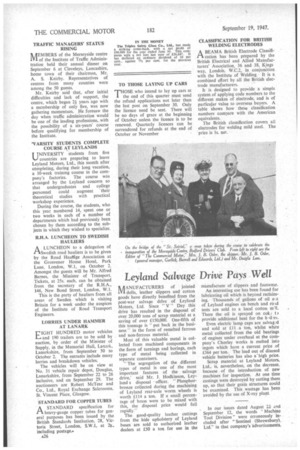Leyland Salvage Drive Pays Well
Page 28

If you've noticed an error in this article please click here to report it so we can fix it.
N iTANUFACTURERS of jointed IVI dolls, leather slippers and cotton goods have directly benefited from the post-war salvage drive of Leyland Motors, Ltd. Since " V " Day this drive has resulted in the disposal of over 20,000 tons of scrap material at a saving of over £150,000. One-fifth of this tonnage is "put back in the business" in the form of remelted ferrous and non-ferrous material.
Most of this valuable metal is collected from machined components in the form of turnings and borings, each type of metal being collected in separate containers.
" The segregation of the different types of metal is one of the most important features of the salvage drive,' said Mr. J. Hodkinson, Leyland s disposal officer, "Phosphorbronze collected during the machining of Leyland rear-axle worm wheels is worth £114 a ton. lf a small percentage of brass were to be mixed with this, the disposal price would fail rapidly " The good-quality leather cuttings From the hide upholstery of Leyland buses are sold to authorized leather dealers at £50 a ton for use in the manufacture of slippers and footwear.
An interesting use has been found for lubricating oil which is beyond reclaiming. Thousands of gallons of oil o It of Leyland engines on bench and ro id tests are sold to a local cotton mil. There the oil is sprayed on cok; t provide additional heat for the b sit rrs,
Even electric lamp caps are salvag:d and sold at £11 a ton, whilst white metal collected from the old bearings of engines under overhaul at the company's Chorley works is melted into ingots which have a current price of £364 per ton. The lead out of disused vehicle batteries has also a•high price.
Scrap material at Leyland Motors, Ltd., is, nevertheless, on the decrease. because of the introduction of new machines for inspection. At one time castings were destroyed by cutting them up, so that their grain structures could be examined. This wastage has been avoided by the use of X-ray plant, In our issues dated August 22 and September. 12, the words " Machine Tool Division" were erroneously included after "Sentinel (Shrewsbury), Ltd." in that company's advertisements.












































































